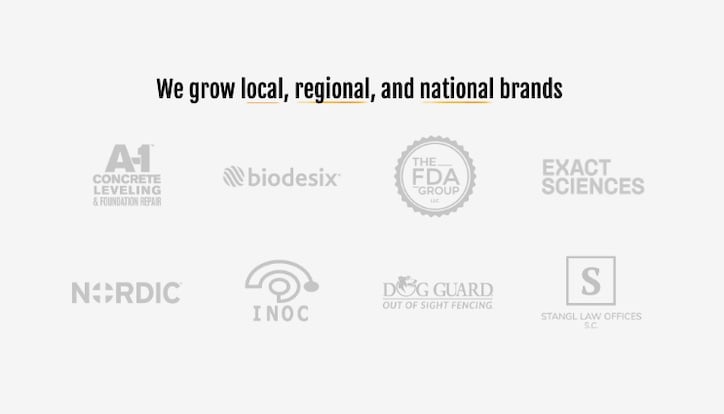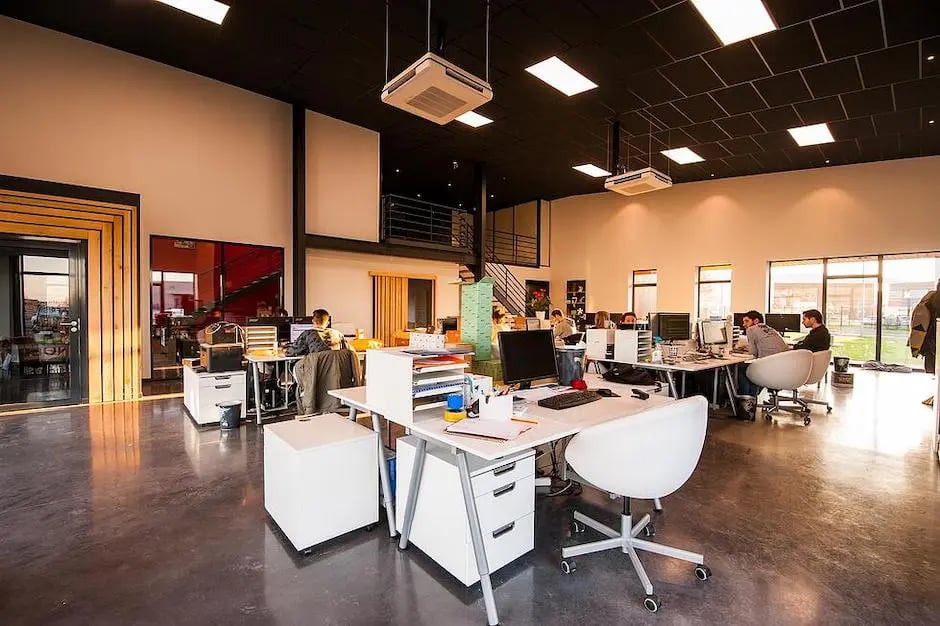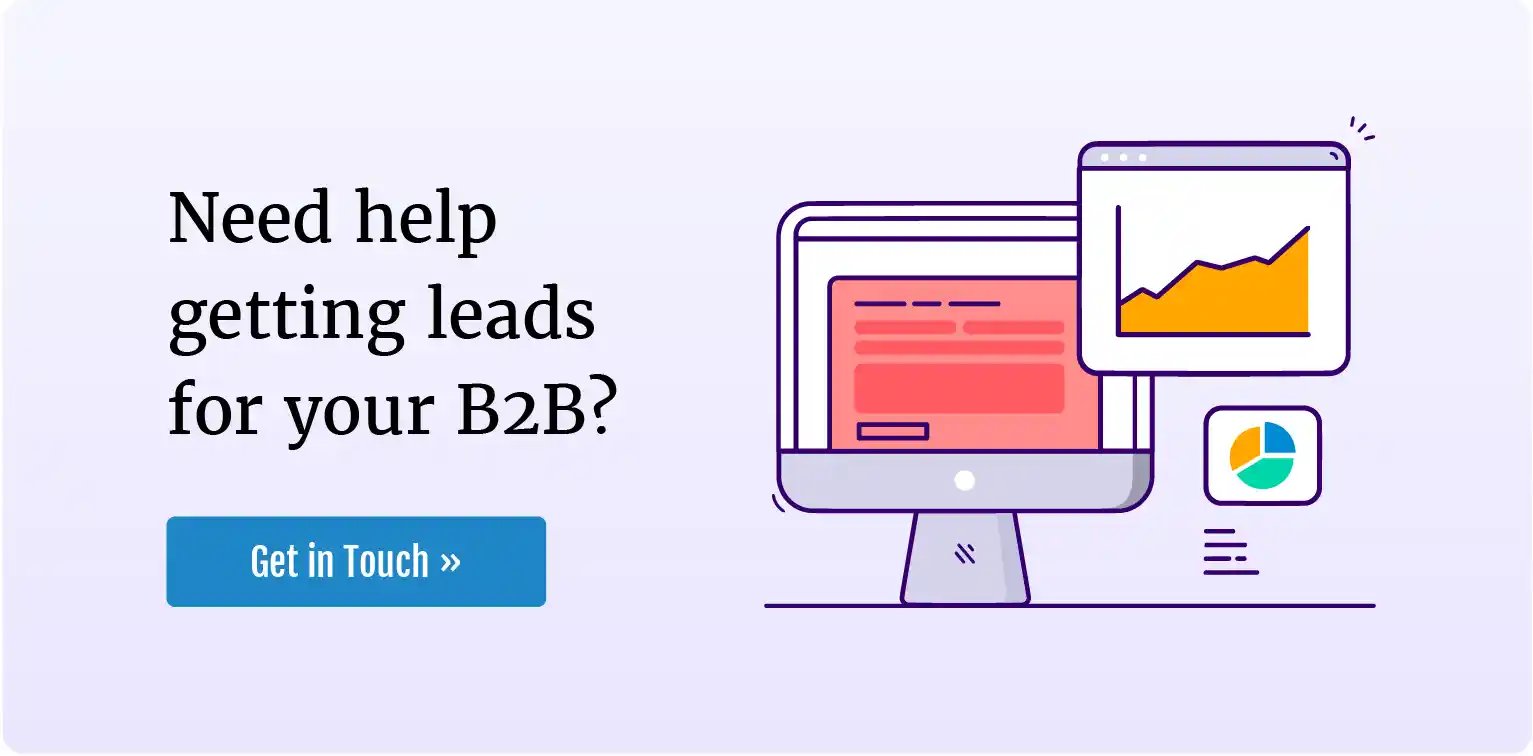Finding the right partner for your B2B company website build or redesign project can be tricky and leave you trying to sift the wheat from the chaff at each stage of the research process.
In this post, we’ll address need-to-knows from where to look for a great provider to narrowing down your list of prospective partners, to finding a great fit.
CONTENTS
- Web design agency vs. development company vs. full-service agency
- How to find a great website vendor
- How to pick the best website companies to contact: 5 tips
- What to know in advance of meeting with an agency
- 11 questions to ask a prospective partner
- 3 questions to ask yourself
- A note about cost
- How we approach site builds
Web design agency vs. development company vs. full-service agency
First, let’s address a potential point of confusion. Web designers, developers, and full service agencies all contribute to the website building process, but in different ways.
Design agencies specialize in how a website looks—the design. Web development companies build everything under the hood of the site—the coding. Full service agencies do both.
Unless your company is quite large, it usually makes the most sense to go with a single provider who can handle both the design and the development competently on the CMS you would like, because this approach tends to be less expensive and easier than working with two different companies.
How to find a great website vendor
Identify your goals, priorities, preferences, and givens
What are the 1–7 goals you’ve set for your business? Do you need to generate more leads? Build awareness? Your website build/redesign should help you reach these goals.
Having a clear idea of what you want to do with your website and what functions you would like it to have can help you better evaluate agency portfolios.
For example, a lot of B2Bs want to use their site for lead generation, so functional, modern forms and analytics capabilities are a must. Meanwhile, a fantastic user experience and conversion optimization make it effortless for leads to move through the funnel and convert.
Or, if you plan to do content marketing, blog pages that present photos nicely, use readable text, have a space for author bios, and support video and audio embeds are a plus.
If you haven’t decided on a content management system (CMS) like HubSpot, Wordpress, or Webflow yet, we highly recommend you do before reaching out to agencies. This way you can narrow your search to agencies with experience on your platform of choice.
If you’ve decided to go with HubSpot but haven’t purchased it yet, talk to us first. As a partner, we may be able to get you a better deal than if you approached HubSpot directly.
Where to look for partners
While you might have already encountered blog posts of “best agencies” or ranked directories, it’s generally best to avoid these. These are generally affiliate networks where agencies pay to have their services listed—essentially ads in disguise.
Instead, we recommend asking around. Tap into your professional network to get referrals and look at reviews.
Additionally, check if your CMS of choice has their own agency directory or agency portfolio gallery. Here’s Hubspot’s.
How to pick the best website companies to contact: 5 tips
- Look at their case studies.
- Study client websites/their portfolio.
- Examine how they market themselves.
- Read reviews.
- Identify strengths and weaknesses.
Now that you have a list of potential agencies, you can narrow it down further (without contacting them). Here are the big things to investigate at this stage.
1. Look at their case studies.
Any agency worth their salt should have up-to-date case studies with quantifiable evidence to prove their worth. In particular, see if they talk about any businesses similar to yours.
This is a positive sign for a few reasons:
- They’re confident enough in their services that they’re willing to provide public evidence.
- They anticipated your need to vet them, which signals they understand how to nurture their own leads and can likely help you nurture yours.
- They already have experience with your industry or companies with similar goals.
Case studies are great for showing what an agency can do, but don't just take the agency's word for it. Contact the business featured in the case study and ask if they'd actually back up what is said about them.
By nature, case studies come with "spin" from the party that's being promoted, so do some research of your own to make sure they're legitimate.
2. Check out websites they’ve built for clients and/or their portfolio
Nothing says more about an agency's ability to fulfill your needs than similar work they've already completed.
Many legitimate agencies display their portfolios (or at least a good chunk of them) right on their website, which makes this easy. They may also display logos of clients you can check out.

Source: Madison Marketing Group
But even if they don't, they should be able to provide you with work examples if you ask them. If they don't provide examples, or the examples are low quality, keep moving.
Source: Columbia Vehicles
As you do this, keep in mind what you want out of a website. Look for examples of sites that work the way you want your site to function.
And in terms of looks and basic functionality, ask yourself:
- How do the sites look? > Are they aesthetically pleasing?
- Is anything hard to use? > Is it hard to get around the site or use anything? Does the menu organization of the pages make sense? Is anything confusing? If you wanted to buy something, how easy is it to contact sales or buy online? Check how fast the homepage loads by dropping the URL into Google’s free tool.
3. Examine how they market themselves.
Check out an agency’s own website. How good is it? Sometimes the cobbler’s children go barefoot, but a skilled agency should be able to produce results for themselves as well as their clients.
As you did before, check out the site’s looks and functionality. Browse their site to see how transparent they are. Do they answer all your questions about working with them? In general, the more transparent and mindful of your needs, the better.
Next, test out their lead generation program. Try subscribing to their blog or downloading one of their content offers and see what happens. You may be entered into a well-thought-out nurturing sequence or, on the other end of the spectrum, ignored completely.
Reviewing a marketing agency's digital processes from a buying perspective is another way to look under the hood at some of the strategies they might implement for you.
4. Read Reviews
Just as you would for another purchase, read an agency’s reviews on Google, relevant social platforms, and platform-specific review sites (such as HubSpot’s Solutions Directory or Adobe’s Solution Partner Directory).
5. Identify strengths and weaknesses
As you research agencies, try to pinpoint their specialties, strengths, and weaknesses.
If they specialize in branding, for example, they might offer fantastic design with website services on the side, but you probably won’t get as functional a website as an agency with a strong proficiency in development. In addition, sometimes some of the work is outsourced, which has its own pitfalls.
What to know in advance of meeting with an agency
- What’s your timeline?
- What’s your budget?
- How much are you willing to be involved in the website building process?
- How much do you plan to be involved in maintaining your website?
Before sitting down with an agency, it’s helpful to know the answers to a few questions first.
1. What’s your timeline?
Do you have a specific deadline for this website project (such as an upcoming trade show, busy season, or company event), or is it more flexible?
Websites take a long time to build correctly, so you’ll want to discuss this with an agency upfront to get a feel for whether or not it’s possible for them to meet your initial deadline.
2. What’s your budget?
If you were to set a cost range, how much do you expect to spend on a website? Agencies charge different amounts for a website build, but you can expect to pay five figures for a basic, quality website, from around $16,000–$30,000, and a few more thousand dollars for SEO strategy recommendations.
You can pay less, but sometimes cheaper sites are a false economy. Generally, providers are able to sell websites for less because they cut corners. This often takes the form of less streamlined code and poorer functionality.
This can come back to bite you later if the website doesn’t function at the level visitors expect and you lose opportunities to convert them into leads as a result, or if you have to pay additional money for someone to fix bugs and it takes longer to make edits because the code is set up so only a programmer is able to make the changes.
3. How much are you willing to be involved in the website building process?
A good agency might involve you in the site building process more than you think. For example, our agency routinely submits designs and copy for client review.
Preparing to set aside this time or delegate work out to your team can help avoid site launch delays, among other headaches.
4. How much do you plan to be involved in maintaining your website?
Do you, or one of your employees, plan to be in charge of maintaining your website, or do you plan to hire a third party to do this for you?
The agency you ultimately work with will need to know your preferences so they can build a website that is easy and flexible enough for you to manage and tweak, and train you on the software as needed.
If your B2B doesn’t have time to maintain your site, this is also good to consider ahead of time. Maybe you should shop for an agency that can both build and maintain your site.
11 questions to ask a prospective partner (and 3 to ask yourself)
When you first engage with the agency, be sure to ask these questions.
- Do you write copy, design, and develop in-house, or is it outsourced?
- Can you provide references for your copywriting, design and development work?
- What is your strategy for generating leads?
- What would the deliverables be for this project?
- Are you willing to train me to eventually take over marketing tasks?
- What certifications and accreditations do you have?
- Do you partner with any other organizations?
- Do you have experience with my industry?
- How do you approach SEO?
- How is the agreement structured?
- Who would own the domain?
- Do they seem honest and clear about their intentions?
- Do they tailor their pitch to suit my business?
- Do they listen to you?
1. Do you write copy, design, and develop in-house, or is it outsourced?
Sometimes agencies cut corners by subcontracting work. An agency should be honest about whether they do this. If they do, ask them how they ensure a quality product is delivered.
2. Can you provide references for your copywriting, design and development work?
In addition to public reviews, a good agency should be able to share positive client testimonials.
3. What is your strategy for generating leads?
If lead generation is the primary aim of rebooting your website, a good agency should be able to provide suggestions for conversion optimization after learning about your goals and needs.
4. What would the checkpoints be for this project, and what would the deliverables for each stage be?
A good agency should check in with you regularly about a project, and build in review and client approval stages. More frequent check-ins help keep projects on track so that you stay on budget, on schedule, and meet expectations.
5. Are you willing to train me to eventually take over marketing tasks?
Agencies know that eventually, even long-term partnerships end. As a result, a good agency will be willing to help you find your feet and become increasingly self-sufficient. If they want to control everything and limit your access to data, that’s a big red flag.
6. What certifications and accreditations do you have?
Sometimes, agencies will have accreditations for specific skills, such as Google Analytics reporting or inbound marketing, which can be helpful to know.
7. Do you partner with any other organizations?
Sometimes, an agency will partner with other companies in their industry, like HubSpot, and have additional expertise to offer.
8. Do you have experience with my industry?
An agency with experience in your industry already has insights into your world which can help them do better work for you.
9. How do you approach SEO?
A skilled website provider should be able to tell you how they would make your website baseline search engine friendly, even if you don’t invest in a formal SEO strategy. If you want to purchase strategy, probe what sorts of things they do to optimize sites or generate leads through search engines.
10. How is the agreement structured?
Particularly when there’s a lot of money on the line, it’s a good idea to ask how the agency would structure your agreement.
11. Who controls the domain and other digital assets?
A good provider will ensure that you have full control of your own website from domain ownership to analytics and ad platforms. A common issue with poor agencies is they will add your records to their agency accounts, making it a hassle to uncouple when you no longer need their services. This is like getting locked out of your own house.
3 Questions to ask yourself
During and after the meeting, do a gut check. Ask yourself:
1. Do they seem honest and clear about their intentions?
A good partner will be transparent about their methods throughout your relationship, from billing to strategy.
2. Do they tailor their pitch to suit my business?
A generic pitch may signal a one-size-fits-all approach that may produce a lower-quality result.
3. Do they listen to you?
A good agency should attend to and respond to your specific needs and communicate clearly. They should also ask you plenty of questions. This can give you a window into what it might be like to work with them.
For more tips on prepping for your first agency meeting, check out our whitepaper.
A note about cost
Once you choose an agency, you’ll want to ask some additional questions before signing on the dotted line and throughout the process to ensure everyone is on the same page.
Make sure the agency tells you what costs and features are included in the build, including the number of revision rounds you get to make before the copy or design is set in stone.
Often, it can be hard to tell whether a cost is an investment that will pay dividends or an add-on included to enrich the vendor.
If you’re concerned about the cost of something in your website project, ask the agency how it furthers your goals. A good provider will be able to give a satisfying answer.
It can also be a challenge to get around the fact that high-quality websites cost money, especially when you get custom-built features, which take extra time to build.
At the same time, those features often serve a concrete marketing or sales purpose and are there to serve your bottom line.
How we approach site builds
We work with clients to refresh sites or build them from the ground up according to their needs, baking in SEO to help visitors find and use them.
Source: Superior One Solutions
This includes considerations like conversion optimization (constructing the site in a way that encourages visitors to take next actions), marketing automation (automating tasks like notifying site owners when someone fills out a form), and additional SEO work when the client requests it.
A typical website project with us looks something like this:
- Preliminary strategy assessment: We evaluate your needs, current site, and other marketing activities.
- Recommendations and proposal: We present you with a proposal that includes a strategy, information about pricing and cost, and possibly a project timeline.
- Site architecture: We create a map of how your new site will be laid out.
- Copy: We write the copy for each page.
- Copy revision: We submit the copy to the client for their review and approval.
- Design: We plan the design of site pages and create mock-ups of how particular pages will look.
- Design revision: We show mock-ups to the client and get feedback.
- Development: We code the essential building blocks of the site using the design and create staged versions of each page that are editable, shareable, and interactive, but not publicly visible.
- Bug fixes: We fix issues with the site and make tweaks.
- Site QA: We perform a final check on the site to catch any major inconsistencies and ensure everything is in working order before publishing the site.
If you’re looking for a one-stop-shop to help you update or build a B2B website for lead generation, check out this case study. Better yet, drop us a line ↓
Topics: Working with an Agency






